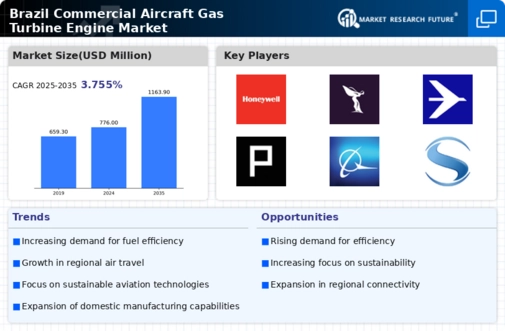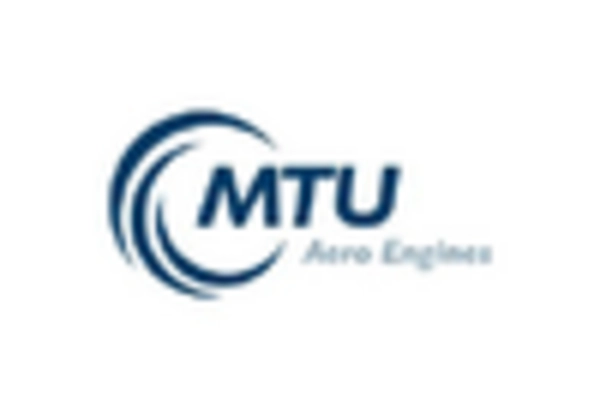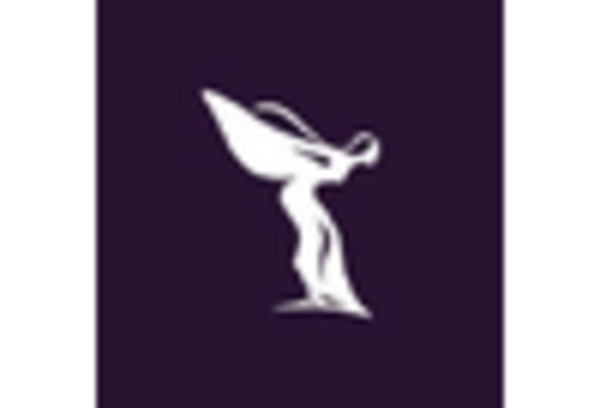Focus on Fuel Efficiency
The commercial aircraft-gas-turbine-engine market in Brazil is significantly influenced by the industry's focus on fuel efficiency. Airlines are increasingly prioritizing the acquisition of aircraft equipped with advanced gas turbine engines that offer lower fuel consumption and reduced emissions. This trend is driven by rising fuel costs and regulatory pressures to minimize environmental impact. The Brazilian aviation sector is projected to see a shift towards engines that utilize sustainable aviation fuel (SAF), which could account for up to 30% of total fuel consumption by 2030. Consequently, manufacturers are investing in research and development to create more efficient engines, which is likely to enhance the competitive landscape of the commercial aircraft-gas-turbine-engine market.
Rising Air Travel Demand
The commercial aircraft-gas-turbine-engine market in Brazil is experiencing a significant increase in demand due to rising air travel. With a growing middle class and improved economic conditions, more Brazilians are opting for air travel, leading to a projected annual growth rate of approximately 5% in the aviation sector. This rise in passenger numbers necessitates the expansion of airline fleets, thereby driving the demand for new aircraft and, consequently, gas turbine engines. Airlines are investing in modern, fuel-efficient aircraft to meet this demand, which further stimulates the commercial aircraft-gas-turbine-engine market. The Brazilian government has also been supportive of aviation growth, implementing policies that encourage investment in the sector, which may enhance the market's potential in the coming years.
Emerging Regional Airlines
The emergence of regional airlines in Brazil is reshaping the commercial aircraft-gas-turbine-engine market. These airlines are focusing on connecting underserved routes, which is likely to increase the demand for smaller, more efficient aircraft. As regional carriers expand their fleets, they often opt for modern gas turbine engines that provide operational flexibility and cost-effectiveness. This trend is supported by favorable financing options and government incentives aimed at promoting regional connectivity. The growth of regional airlines not only diversifies the market but also stimulates demand for specific types of engines tailored to short-haul operations, thereby influencing the overall dynamics of the commercial aircraft-gas-turbine-engine market.
Government Investment in Infrastructure
Brazil's government is actively investing in aviation infrastructure, which is likely to bolster the commercial aircraft-gas-turbine-engine market. Recent initiatives include the modernization of airports and the expansion of air traffic control systems, aimed at accommodating the increasing number of flights. The government allocated approximately $1 billion for infrastructure improvements in the aviation sector, which is expected to enhance operational efficiency and safety. This investment not only supports existing airlines but also attracts new entrants into the market, thereby increasing the demand for commercial aircraft and their engines. As infrastructure improves, the commercial aircraft-gas-turbine-engine market is poised for growth, driven by enhanced connectivity and service quality.
Technological Advancements in Engine Design
Technological advancements in engine design are playing a crucial role in shaping the commercial aircraft-gas-turbine-engine market in Brazil. Innovations such as additive manufacturing and advanced materials are enabling manufacturers to produce lighter and more efficient engines. These developments are expected to enhance performance while reducing maintenance costs, which is appealing to airlines looking to optimize their operations. The Brazilian market is witnessing increased collaboration between local manufacturers and global players to leverage these technologies. As a result, the commercial aircraft-gas-turbine-engine market is likely to benefit from enhanced product offerings that meet the evolving needs of airlines, potentially leading to increased market share for innovative engine designs.
















